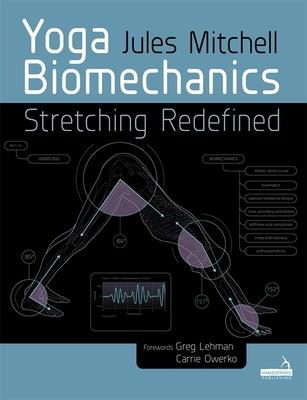Yoga Biomechanics: Stretching Redefined provides a unique evidence-based exploration into the complexities of human movement and what a safe, effective yoga practice entails. The emphasis is taken off flexibility and centered around a narrative of body tissue adaptation. Conventional approaches to modern yoga are examined through a biomechanist's lens, highlighting emerging perspectives in both the rehabilitation and sport science literature. Artfully woven throughout the book is a sub-text that improves the reader's research literacy while making an impassioned plea for the role of research in the evolution of how teachers teach, and how practitioners practice. Yoga teachers and yoga practitioners alike will discern yoga asana for its role in one's musculoskeletal health. Yoga therapists and other allied healthcare providers can apply principles discussed to their respective professions. All readers will understand pose modifications in the context of load management, reducing fears of injury and discovering the robustness and resilience of the human body.
Coverage includes - Biomechanics Basics; Force, Applied/Modified Loads, and Stress; Progressive Overload and Specificity; Conventional Stretching; Stretching and Performance; Eccentrics; Mechanical Properties of Connective Tissue; Tissue Behavior, Structure, and Composition; Tissue Adaptation, Capacity, and Tension; Exploration into Soft Tissue Injuries; Alignment and Posture Features include - Highlights meaningful, evidence-based applications and examples of yoga and/or stretching. Provides guidelines for non-researcher's critical interpretation of research, helping them to avoid making poor choices based in well-worn beliefs and hackneyed assumption. Pushes teachers to a deeper understanding of biomechanics, beyond simply memorizing anatomy, empowering them to make smart choices for instructing a variety of populations in both private and group class settings. Encourages variety in popular modern-day asana, using props and a keen eye, given our understanding of how the body's tissues adapt to applied loads. Educates yoga teachers to think beyond the scripted yoga education they received, stretching their minds to further understand and redefine stretching of the human body.
Yoga Biomechanics: Stretching Redefined provides a unique evidence-based exploration into the complexities of human movement and what a safe, effective yoga practice entails. The emphasis is taken off flexibility and centered around a narrative of body tissue adaptation. Conventional approaches to modern yoga are examined through a biomechanist's lens, highlighting emerging perspectives in both the rehabilitation and sport science literature. Artfully woven throughout the book is a sub-text that improves the reader's research literacy while making an impassioned plea for the role of research in the evolution of how teachers teach, and how practitioners practice. Yoga teachers and yoga practitioners alike will discern yoga asana for its role in one's musculoskeletal health. Yoga therapists and other allied healthcare providers can apply principles discussed to their respective professions. All readers will understand pose modifications in the context of load management, reducing fears of injury and discovering the robustness and resilience of the human body.
Coverage includes - Biomechanics Basics; Force, Applied/Modified Loads, and Stress; Progressive Overload and Specificity; Conventional Stretching; Stretching and Performance; Eccentrics; Mechanical Properties of Connective Tissue; Tissue Behavior, Structure, and Composition; Tissue Adaptation, Capacity, and Tension; Exploration into Soft Tissue Injuries; Alignment and Posture Features include - Highlights meaningful, evidence-based applications and examples of yoga and/or stretching. Provides guidelines for non-researcher's critical interpretation of research, helping them to avoid making poor choices based in well-worn beliefs and hackneyed assumption. Pushes teachers to a deeper understanding of biomechanics, beyond simply memorizing anatomy, empowering them to make smart choices for instructing a variety of populations in both private and group class settings. Encourages variety in popular modern-day asana, using props and a keen eye, given our understanding of how the body's tissues adapt to applied loads. Educates yoga teachers to think beyond the scripted yoga education they received, stretching their minds to further understand and redefine stretching of the human body.